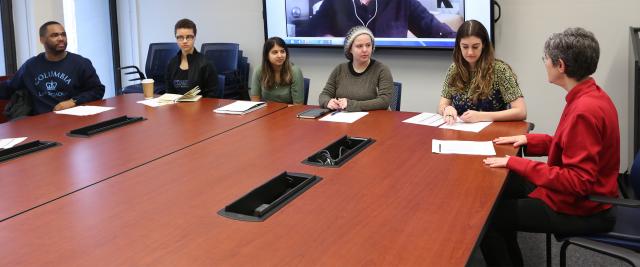Columbia Law School’s innovative Policy Labs prepare our graduates to thrive in these settings. Policy Labs combine cutting-edge theory with hands-on learning, policy, and practice; litigation and transactional work; seminar-style, larger-class, and small-group settings; and live client as well as simulation experiences. They enable law students to work in teams with each other, with professionals from other fields, and with the communities they serve. Students work and learn together with faculty, advocates, government officials, and community leaders who have joined together to solve challenging problems that require ongoing learning and a wide range of expertise.
Current Policy Lab and Practicum Offerings
Structural Change in Public Education is an immersive full-semester program bringing together graduate and professional students from around the country to study and gain hands-on experience helping public education systems achieve the systemic legal and policy change needed to improve educational equity in the US and Brazil. This course will be offered in Fall 2024 and Spring 2025. Enrollment is through the Experiential Application Process. For more information, visit our website.
Sexuality and Gender Law Practicum, This 4 credit practicum offers students a cutting-edge opportunity to step into the shoes of lawyers advocating on sexuality and gender law issues with leading organizations doing this work. This course combines a weekly two-hour seminar and project work. The seminar component focuses on the Practicum’s cornerstones of collaboration, communication, and a multidimensional approach to advocacy--- a practice of being smart, strategic, and creative in identifying and deploying resources to advocate for social change. The Project work component will build upon the seminar sessions so students can gain insight into movement lawyering in sexuality and gender law. Students work intensively throughout the semester at leading organizations focused on litigation, legislative advocacy, public policy analysis, and public education. This course will be offered in Spring 2025. Enrollment is through the Experiential Application Process.
Lawyer Leadership: Leading Self, Leading Others, Leading Change, a 5-credit experiential seminar, cultivates students’ leadership capacities through the development of concrete, practical skills grounded in the issues and problems that matter most to students. Through whole-class meetings, lab sessions, and a semester-long group project that students design and implement themselves, students will have an opportunity to develop and advance their capacity to interact effectively in groups, give and receive feedback, engage in difficult conversations, build racial and cultural literacy, navigate new and challenging environments, and achieve collective aims. The Lawyer Leadership course will accept applications directly here (not through the experiential enrollment portal).
Empirical Legal Studies Lab, a laboratory for intensive legal research, is a faculty-student research partnership designed to conduct data-intensive law or practice-related investigations, develop specialized technical skills, and produce original scholarship. This course will be offered Fall 2024. This course will accept applications directly, not through the experiential application process. For more information, visit the curriculum guide.
Courses tagged experiential credit can be found by selecting "additional attributes" in the Curriculum Guide.
